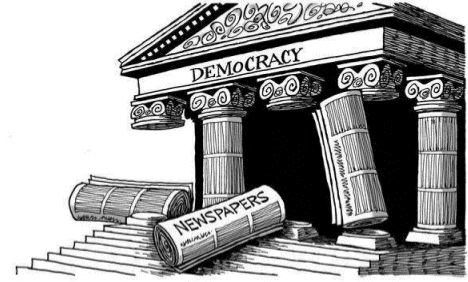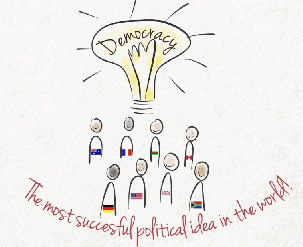Key Concepts - Democracy in the Contemporary World | Civics for Class 9 PDF Download
1. The March of Democracy has met with setbacks and successes throughout history.
2. In 1900 there were only a few democratic states. After the Second World War, in 1950, more countries were added. The newly independent nations of Asia chose democracy. In 1975 colonies in Africa had become independent and most of them chose democracy as a form of government. A giant leap was taken in 1991. The fall of the Soviet Union created 15 new states and more democracies.
 Fig. Democracy in contemporary worldTwo Tales of Democracy
Fig. Democracy in contemporary worldTwo Tales of Democracy
- Many countries struggled for democracy, suffered setbacks. In Chile, the democratic government of Allende was overthrown in 1973, and Pinochet became the military ruler. Democracy was restored again in Chile in 1988. In Poland, a non-democratic country, a one party rule was replaced by democracy under Lech Walesa.
Two Features of Democracy
- Democracy, hence, is a form of government that allows people to choose their own leaders.
- People have the freedom to express their views, freedom to organise and freedom to protest against injustice.
Phases in the Expansion of Democracy
- By 2005, 140 countries have held multi-party elections. More than 80 countries have made advances towards democracy since 1980.
- Stills there are many countries where people cannot elect their leaders. In Myanmar the elected leader Aung San Suu Kyi has been imprisoned by the military rulers (1990). No amount of international support has helped in her release.
 Fig. unity a key feature of democracy
Fig. unity a key feature of democracy
Democracy at Global Level
- Is it possible to have democracy at global level? Not at present.
- The UN, the International Monetary Fund and the World Bank are global associations of the world. They attempt to maintain peace and security among the countries of the world. They give loans and money to governments.
- They are not fully democratic. Five countries — US, UK, France, China and Russia — have the veto power in the Security Council. The World Bank has a US President always and the International Monetary Fund is in the hands of seven powerful nations.
Promotion of Democracy
- Many powerful countries like the United States of America believe that democracy should be promoted in the world — even by force.
- Powerful countries have launched attacks on non-democratic countries.
- Iraq is the biggest example. USA and its allies attacked and occupied Iraq without UN sanction, on the pretext of Iraq possessing nuclear weapons. They have even held forced elections.
- The urge for democracy should come from the people and should not be imposed.
|
17 videos|89 docs|30 tests
|
FAQs on Key Concepts - Democracy in the Contemporary World - Civics for Class 9
| 1. What is democracy and why is it important? |  |
| 2. What are the different types of democracy? |  |
| 3. How does democracy work in practice? |  |
| 4. What are the challenges to democracy in the contemporary world? |  |
| 5. How can we strengthen democracy in the contemporary world? |  |






















